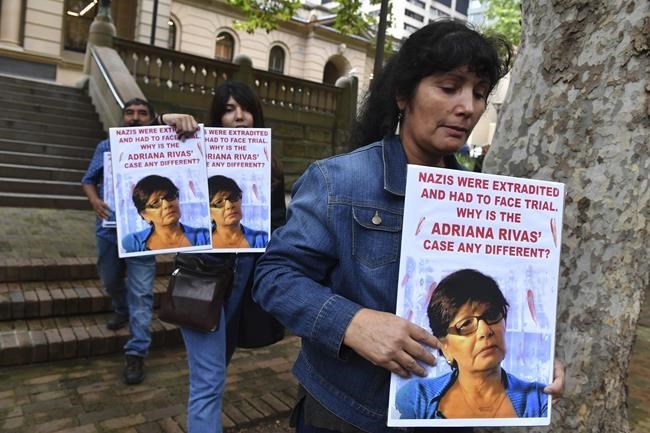
FILE - In this April 2, 2019, file photo, members of the Chilean Australian community from the National Campaign for Truth and Justice in Chile are seen outside the Central Local Court in Sydney Australia. An Australian judge, Thursday, June 24, 2021, has dismissed a woman's appeal against extradition to Chile where she is wanted on kidnapping charges dating to Augusto Pinochet's military dictatorship in the 1970s. (Dean Lewins/AAPImage via AP, File)
Republished June 24, 2021 - 12:39 AM
Original Publication Date June 23, 2021 - 5:31 PM
CANBERRA, Australia (AP) — An Australian judge on Thursday dismissed a woman’s appeal against extradition to Chile, where she is wanted on kidnapping charges dating to Augusto Pinochet’s military dictatorship in the 1970s.
Adriana Rivas had appealed a magistrate’s decision in October that she could be extradited on allegations that she kidnapped seven people in 1976 and 1977, including Communist Party leader Victor Diaz and party member Reinalda Pereira, who was five months pregnant.
Rivas was an assistant to Manuel Contreras, the head of the DINA secret police during Pinochet’s dictatorship. Rivas, 68, denies ever meeting the alleged victims, who have never been found.
Federal Court Justice Wendy Abraham in Sydney ruled that Rivas could be extradited on the seven charges of aggravated kidnap and ordered her to pay the Chilean government’s court costs. She can appeal the judgment before a full bench of the Federal Court.
Abraham said there was no substance to Rivas’ submission that the lower court had “engaged in a rubber stamping exercise” in approving her extradition.
Rivas faces potential maximum penalties of a life sentence on each of five charges, and 20 years on each of the remaining two counts.
Her lawyers argued Rivas was not a DINA agent and her work was mundane. Her tasks included collecting laundry, making coffee and translating, they said.
They also contended the alleged victims were detained following arrests, not kidnapped, and that those actions were carried out by the state, not by an individual.
Abraham said she did not have to determine Rivas’ guilt or innocence in deciding whether she could be extradited.
Rivas’ lawyers had argued the magistrate was mistaken in finding that Rivas ought to have known the detentions were unlawful and would lead to torture and murder.
They also argued the magistrate should not have accepted the “recharacterization” of events from the 1970s that ignored the historical background.
Chilean-born lawyer Adriana Navarro, a Sydney-based advocate for Pinochet’s victims, said victims’ families welcomed the court ruling.
“They’re elated, very emotional. Many of them had a lot of trouble sleeping last night wondering what will happen, so for them it is extremely important,” Navarro told Australian Broadcasting Corp.
“It’s the second time Rivas has been told your arguments don’t have merits,” she added.
Navarro said several of Rivas’ accomplices had already been convicted and sentenced in Chile.
Rivas moved to Australia in 1978 and was detained in Chile during a visit to see family in 2006. She was released after some months on probation and fled to Australia in 2009.
She lived quietly in Sydney’s wealthy eastern suburbs, working as a part-time nanny and cleaner until her arrest in February 2019 on a Chilean Supreme Court extradition order.
Several court attempts for provisional release during the extradition hearing have failed. Australia and Chile have had an extradition treaty since 1993.
In 2014, Rivas told Australia’s Special Broadcasting Service that she was innocent of the charges, but defended the use of torture in Chile at the time as necessary.
“They had to break the people — it has happened all over the world, not only in Chile,” she said.
News from © The Associated Press, 2021